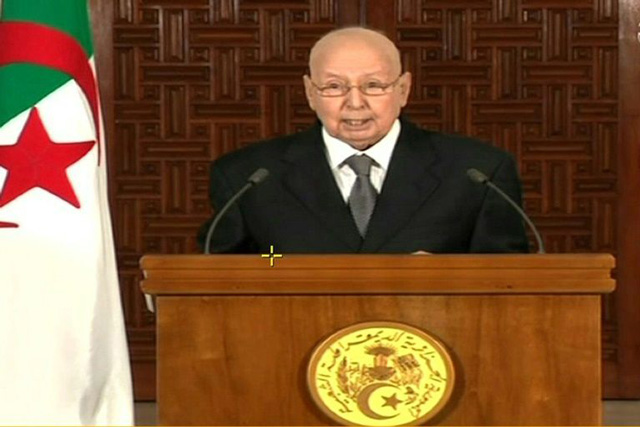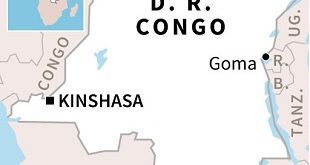
Algiers, Algeria | AFP | Algeria’s interim president Abdelkader Bensalah has called for a national dialogue to prepare for delayed presidential elections, vowing that the state and the military would remain neutral in the process.
What does the proposal mean in a country wracked by months of anti-government protests that led to the resignation in April of veteran president Abdelaziz Bouteflika?
– How does it work? –
In a speech on Wednesday he did not set a timetable for when the talks would be launched. But he said “this dialogue… will be led freely and with total transparency by national independent figures who have credibility and who are not linked to any party”.
“The state in all its components, including the military, will not be party to this dialogue and will remain neutral throughout,” Bensalah added.
His comments were a clear response to protesters who have flooded the streets of the Algerian capital and other cities and towns since February, initially against a bid by Bouteflika to seek a fifth term.
But even after the ailing president resigned in April, protesters have continued to rally, pushing for key backers of Bouteflika’s 20-year-rule — such as Bensalah — to step down before any new polls to elect his successor are held.
“It was a beautiful speech” but “(we) prefer to wait and see how the initiative will be implemented,” said Ahmed Sodok, an MP from the main Islamist opposition party, the Movement for the Society of Peace (MSP).
– Why now? –
Bensalah made the proposal on the eve of Algeria’s 57th anniversary of independence from French rule and ahead of the 20th consecutive Friday of anti-government demonstrations.
His offer comes just days before his interim mandate expires on July 9, in line with the constitution which stipulates a 90-day period during which new presidential elections should be held.
Following his appointment by lawmakers on April 9, Bensalah pledged to organise a “transparent” presidential election but a vote planned for July 4 was scrapped after the only two candidates were rejected.
During the weekly protests, demonstrators have been chanting: “No elections with this gang in power.”
But during his speech, Bensalah urged demonstrators to set aside “unrealistic requirements that are likely to prolong the current situation and drag our country into a… constitutional vacuum”.
– Who will rule after July 9? –
Bensalah has already said that because of Algeria’s “exceptional situation” he has no other choice but to prolong his interim as head of state until a new presidential election.
After July 9, he will therefore remain the interim president, a situation which historian and Algeria expert Karima Direche says will be totally “outside the framework” stipulated by the constitution.
Protesters have repeatedly called on Bensalah and other Bouteflika-era officials to step down, but they believe that the real powerbroker today in Algeria is army chief Ahmed Gaid Salah.
Gaid Salah was an ally of the ailing president, but as pressure from demonstrators mounted he ultimately called for the long-time leader’s impeachment.
– Conditions for dialogue –
“Everything will depend” on who is chosen to take part in the dialogue proposed by the interim president, says Abdelouahab Fersaoui, president of the Rally for Youth Action civil society group.
Sociologist Nacer Djabi says protesters mistrust the authorities and have a list of demands before agreeing to join any national dialogue.
Top of their list is that authorities put an end to the arbitrary detention of demonstrators during weekly rallies and give air time on state television to the protesters.
– Can the offer bring change? –
The authorities have to act as the situation cannot “last long”, says Direche.
According to her, Algeria’s current rulers believed in vain they could persuade protesters during the three-month interim period of the need to hold speedy elections to find a successor for Bouteflika.
If Bensalah’s offer is rejected, Gaid Salah could accept “the creation of an autonomous entity (that would allow him) to take over the interim presidency”, Direche says.
“It is a plausible scenario.”
But Algeria could be dragged into a deeper crisis, including violence, she adds, insisting that after weeks of protests it is time “to find a political solution”.
 The Independent Uganda: You get the Truth we Pay the Price
The Independent Uganda: You get the Truth we Pay the Price


